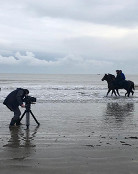Donn's Articles » Five stages
Five stages
Time goes on and goalposts move. We’ve been through the stages: denial, anger, bargaining, depression. It looks like we’re into the acceptance stage now, and that may not be a bad thing.
The more deeply we move into this, the more the realisation crystalises that we are probably going to have to learn to live with Covid-19 for the foreseeable future. Initial emergency mindsets and measures were exactly that, lockdowns and cocoons and everything closed. But if we thought initially that we could bunker down and wait for it to pass, we have had to think again.
The talk of vaccines and anti-virals has receded. A vaccine was imminent, some said. Human trials ongoing. Now we know that even the 12-to-18-month talk is optimistic. It can take seven or eight years for the development of an effective, trusted vaccine. Indeed, the shortest time ever taken for a vaccine to go from the collection of viral samples to the licensing of a drug is four years. And remember, a vaccine for HIV remains elusive.
Of course, the world has moved on since the mumps vaccine was developed in the 1960s, technology has advanced by a half a century. Also, the prize for the development of a Covid-19 vaccine is massive, and huge resources are consequently being channelled into research. But the goal is still a long way off. And even if a vaccine does become a reality in, say, 18 months – which, remember, would break the world record by two and a half years – you can’t lock down the world until the Christmas parties of 2021.
The problem is that there are no forerunners and, consequently, there is no precedent. SARS and MERS are half-brothers to Covid-19, all three are coronaviruses, all cause a shortness of breath, a cough, a fever. But there are key differences. For example, Covid-19 appears to be transmitted more easily, and at an earlier stage of infection.
The medical experts are still busy learning about Covid-19. Reassuringly, the fatality rate of Covid-19 is significantly lower than it is for SARS and for MERS although, worryingly, no treatment was ever diagnosed for SARS or MERS, and no effective vaccine was developed for either.
Opinions and directives in different areas of Irish life have changed within days. We went from the Leaving Certificate definitely will go ahead, to the Leaving Certificate definitely won’t go ahead, to re-opening schools is among the safest things we can do, to hold on a second, we don’t have enough evidence to say that transmission from children does not occur. Even the experts are on a steep learning curve.
The new normal is not something that will happen when Covid-19 is over. In truth, we are in the new normal. We are living it. It crept up on us and enveloped us while we were watching The Last Dance and waiting for the pandemic to pass. The parameters of this new normal are in a constant state of flux, but they are the parameters within which we must live for now.
It’s not easy, learning to co-exist with a pandemic. We know the high-level rules: wear a mask, no hugging, two metres apart, wash your hands. No large groups. Wash your hands again. No hand-shaking. It’s against our nature. But there is general acceptance that that’s the way it has to be. That’s stage five for you.
Loosen the rules a little, and the parameters and the timelines become blurred. Groups of four can now play a round of golf as long as they don’t go to the beach or walk more than five kilometres. Or something. Some shops can open, some can’t, and the lines of differentiation can be a little blurred. Hardware shops can open, homeware shops can’t. But the rules had to be loosened, and the only way to do that is notch by notch. Just letting the rope go was never an option.
It doesn’t mean that it was safer to hang out in a group of four people last Monday morning than it was last Sunday evening. The health risk is still there. It just means that the numbers are manageable now, there is ICU capacity, the health system is not bursting at the seams. That was always the stated goal.
The figures this week have been encouraging, less than 100 new cases every day since last Saturday, and down to a low of 51 on Tuesday. That was the lowest number of new reported daily cases since St Patrick’s Day.
It will not be surprising if the numbers of new cases embark on an upward trajectory again next week, given the loosening of restrictions on Monday and the five-day average incubation period. You have to hope that the health system will be able to cope with a moderate increase, as long as there is not a significant surge. Testing and tracing measures continue to improve and, tellingly, Deputy Chief Medical Officer Dr Ronan Glynn said on Wednesday that, if there is a second wave, at least we will know what to do.
We know what to do now too. Get on with life within the changed and changing parameters as well as we can. We miss things for now, like going racing and going to the pub and seeing friends and going to a game and even going to the office. But that’s how it is for now. We’re learning to live with it.
It helps a lot that there are dates in place now. Targets towards which we can work. And there is solace in the knowledge that, all going well, in time, those things will return. Notch by notch.
© The Irish Field, 23rd May 2020


 Follow Donn
Follow Donn